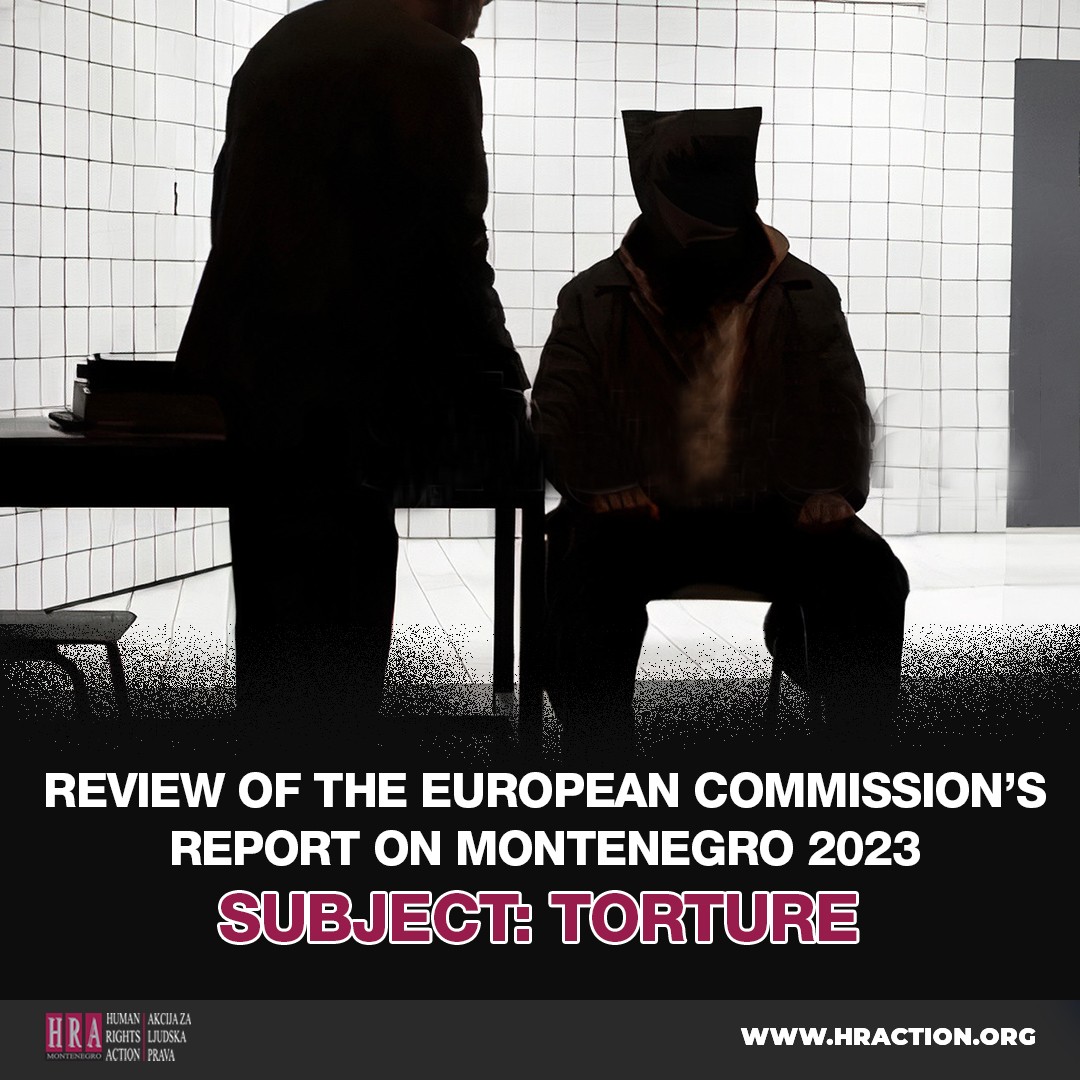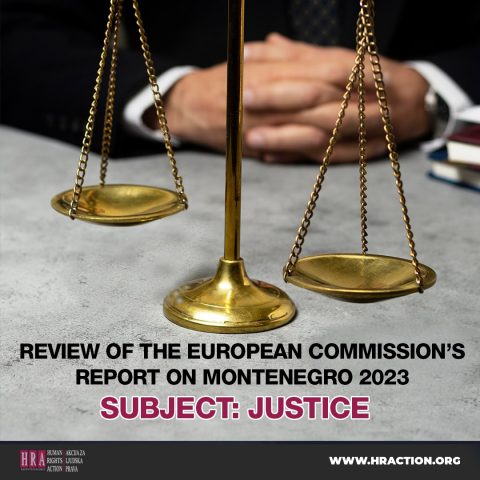
REVIEW OF THE EUROPEAN COMMISSION’S REPORT ON MONTENEGRO 2023 – SUBJECT: WAR CRIMES
08/11/2023
HRA is Asking the New Minister of the Interior for Zero Tolerance for Torture
10/11/2023REVIEW OF THE EUROPEAN COMMISSION’S REPORT ON MONTENEGRO FOR THE YEAR 2023 – SUBJECT: JUSTICE

The Human Rights Action (HRA) finds that the report of the European Commission (EC) comprehensively, precisely and objectively presented the situation in the judiciary as a “continuation of a deep institutional crisis”. It is true that the judiciary is suffering from bad management, corruption and lack of strategic vision, and all of this has been noted. Two key functions have ‘acting’ officials: there has been no legitimate president of the Supreme Court since at least December 2020, and no Supreme State Prosecutor since October 2019. It is now November 2023.
As it has been doing for the last 10 years, the EC reiterated that the Montenegrin judiciary is still being subjected to political influence.
The HRA believes that it is high time to introduce the necessary guarantees against inappropriate influences, as well as other practical conditions required for judicial institutions to be able to ensure the rule of law. The government must seriously consider the introduction of vetting, speed up the work on amendments to the laws, and urgently provide material conditions that are missing and placing the state in a humiliating position.
The EC also noted that there was no progress in the reform of the judiciary, no results in the implementation of the Justice Reform Strategy for 2019-2022 and its Action Plan for 2021-2022, and that the Government failed to adopt the next strategic document in that area.
The HRA reminds that Montenegro has been implementing judicial reforms for more than two decades with insufficient results in terms of independence and responsibility of judges and state prosecutors, because the same criticisms had been repeated every single year for ten years.
The new Government must immediately devote itself to analysing the results of the reform carried out to date, read all the relevant criticisms of foreign and domestic experts, and – based on all this – plan the necessary measures for their implementation, with appropriate deadlines.
The EC unequivocally criticised the state for ignoring the recommendations of the Venice Commission and the European Commission in relation to changes to the Law on the State Prosecutor’s Office, the Law on the Judicial Council and Judges, and the Law on the President. We recall that the EC expressed its expectation that the Law on the State Prosecutor’s Office would be amended back in 2021; however, this task is not even close to being fulfilled.
We appeal to the new Government to include in the new laws all the recommendations of the European legal experts who make up the Venice Commission. Should it refuse to implement some of them, it should provide the public with an adequately reasoned explanation.
This year too, the EC criticised the Judicial and Prosecutorial Councils, stating that they lack proactivity and greater commitment to the performance of their functions; that it is necessary that they improve the transparency of their work by publishing reasoned decisions on the election, promotion and the establishment of responsibility of judges and state prosecutors; that there has been no progress in strengthening the responsibility of judges and state prosecutors for, among other things, ineffective work of commissions for determining ethical responsibility, and the lack of consistency of both Councils in sanctioning judicial office holders for failure to provide data on assets and income.
It was correctly assessed that “the democratic legitimacy of the Judicial Council is being undermined” by the fact that three of its members – Vesna Simović-Zvicer, Loro Markić and Dobrica Šljivančanin – are slowly starting their 10th year in office (even though the Constitution has limited their term of office to four years) because the Assembly Montenegro was unable to elect new members for five years.
It was assessed that, contrary to European standards, the Prosecutorial Council proposed changes to the Law on the State Prosecutor’s Office which would indefinitely extend the term of office of the Acting Supreme State Prosecutor, elected Tatjana Begović as Acting Supreme State Prosecutor, and allowed the Acting Supreme State Prosecutor to continue working as a prosecutor in the Supreme State Prosecutor’s Office after the expiry of her six-month term of office.
The HRA hereby appeals on both Councils to review all the EC’s criticisms – both those from this year and the previous years – and to urgently change their practice.
The only progress that was noted in relation to judicial appointments was the election of three judges of the Constitutional Court in February of this year. However, it was also noted that this did not ensure the full functionality of that court because the current even number of judges is not effective for making decisions, so it is necessary to elect a 7th judge.
What the EC did not recognise is that the number of filled judicial positions in basic courts is now at 78%, which means that these courts are currently lacking more than one fifth of the judges, i.e. 22% or 31 of them. In practice, this is reflected in the promptness of their work – hearings are being scheduled four months apart, decision-making is delayed, and the resolution of citizens’ serious needs is being postponed endlessly.
For the 10th year in a row, the EC also reiterated that Montenegro has not fully applied all the instructions for collecting statistical data in accordance with the standards of the European Commission for the Efficiency of Justice (CEPEJ) and that it should modernise its information system, the so-called PRIS.
The new Government now has both the opportunity and an obligation to finally ensure reliable and comparable statistical data on the work of the Montenegrin judiciary, and to modernise the information system.







 English
English